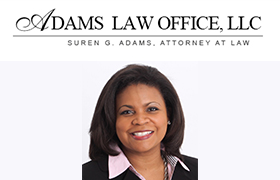Oxon Hill Trusts Lawyer, Maryland
Sponsored Law Firm
-
 x
x

Click For More Info:
-
Adams Law Office, LLC
4201 Northview Drive Suite 401 Bowie, MD 20716 » view mapEstate Planning, Trusts, Probate Getting Clients Financial Houses in Order
At Adams Law Office, LLC, our goal is to provide every client with caring and detail-oriented estate planning services.
800-978-6880  Suren Adams Bowie, MD
Suren Adams Bowie, MDAttorney At Law - MD, 2002
GW Law, J.D. - 2002
 Testimonials
Testimonials“Thank you for all you did during the handling of my bankruptcy. The decision to file a bankruptcy was a" (more...)
 Contact UsEmail or Call 24/7
Contact UsEmail or Call 24/7Call today for your initial evaluation.
Charles E Walton
Trusts, Family Law, Criminal, Commercial Bankruptcy
Status: In Good Standing Licensed: 20 Years
Juanita Wills
Trusts, Elder Law, Civil & Human Rights, Non-profit
Status: In Good Standing Licensed: 27 Years
Antonio Marquette Glenn
Federal Appellate Practice, Trusts, Corporate
Status: In Good Standing Licensed: 14 Years


 Testimonials
Testimonials Contact UsEmail or Call 24/7
Contact UsEmail or Call 24/7
